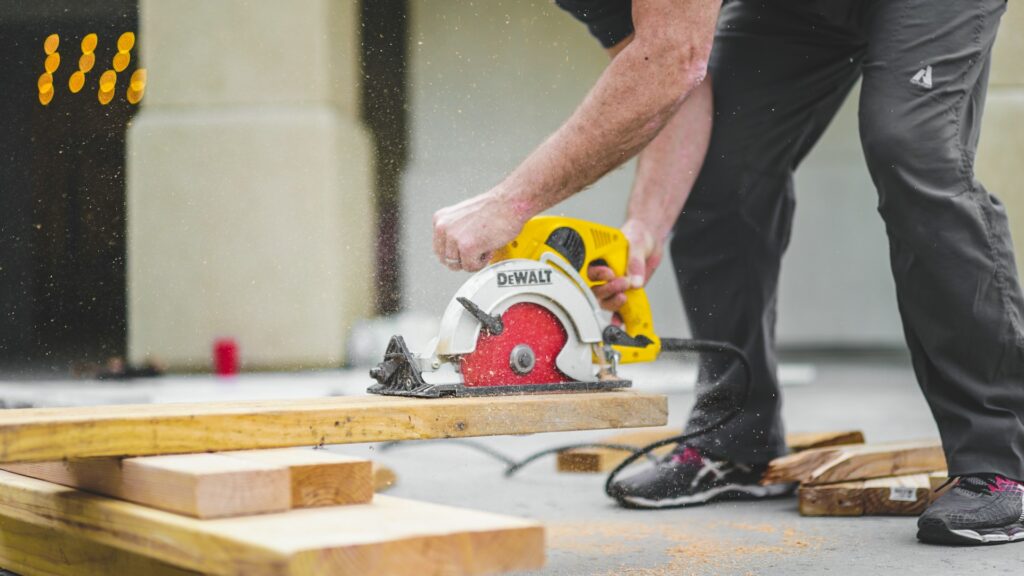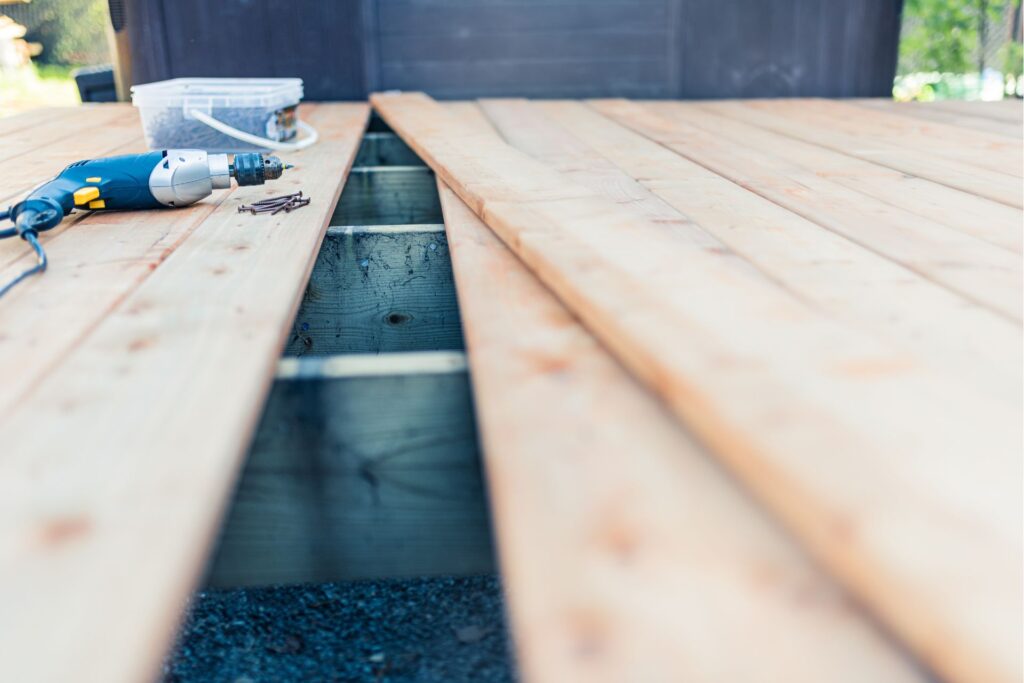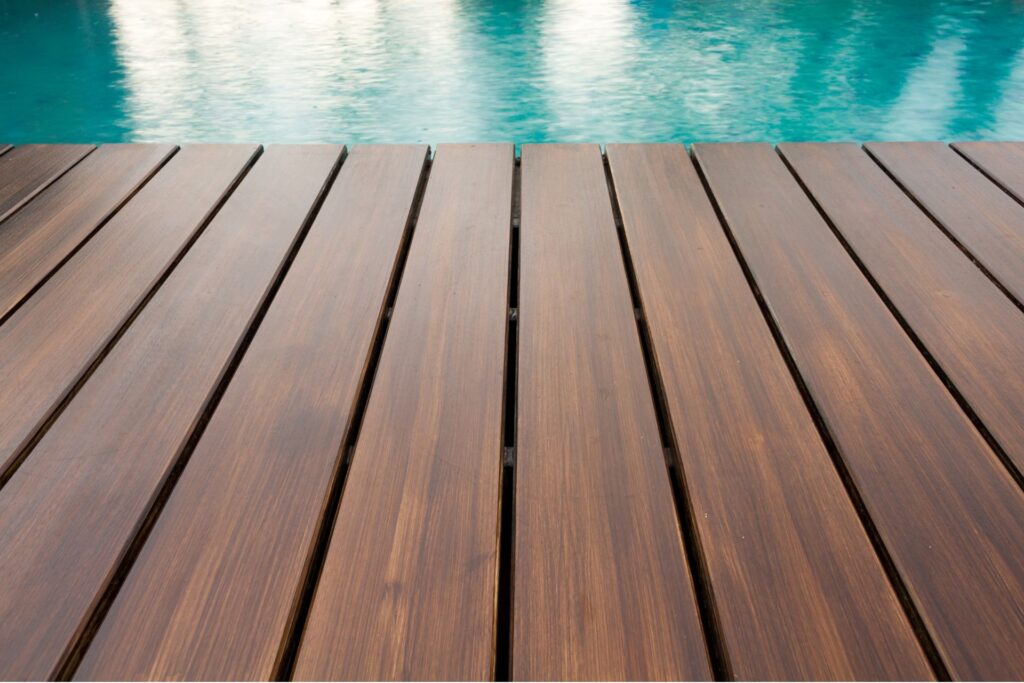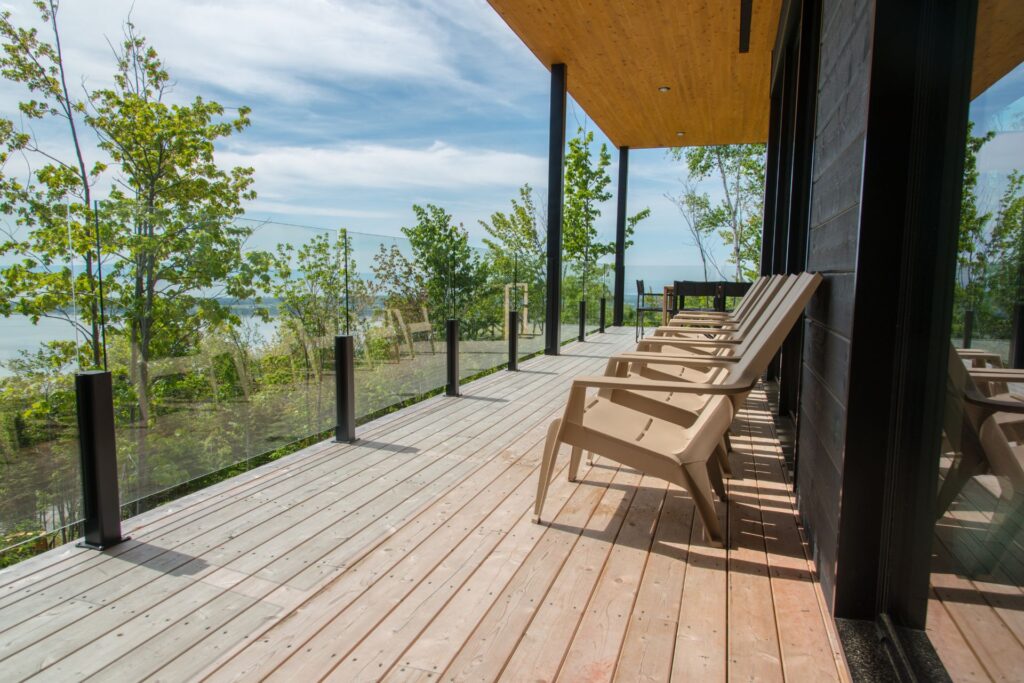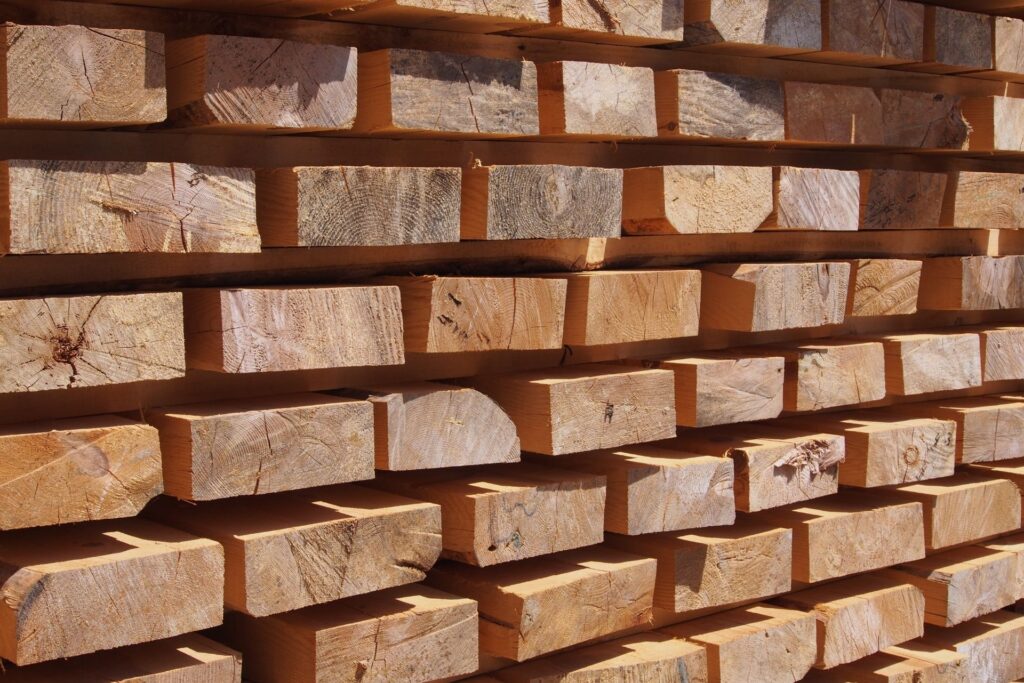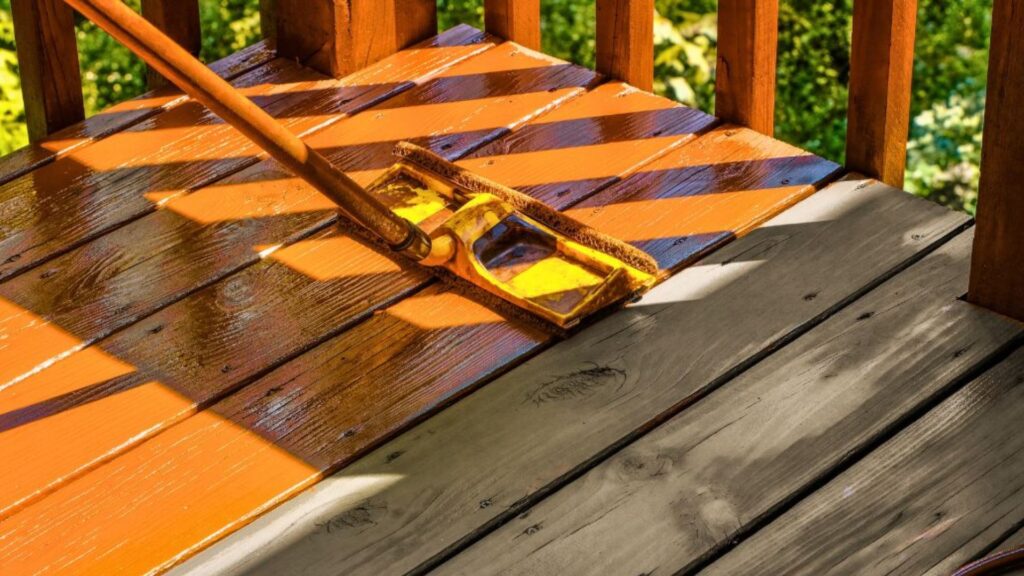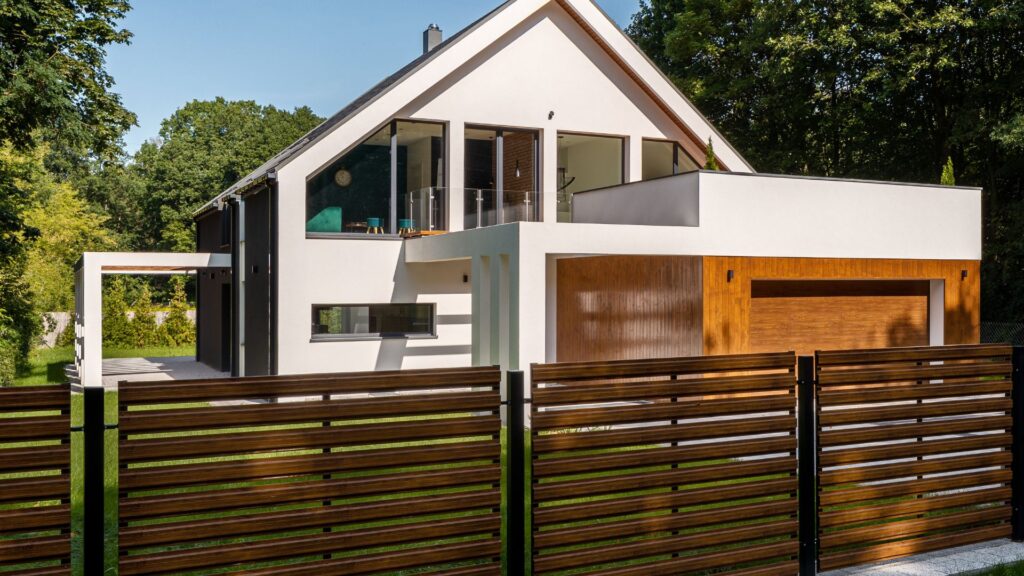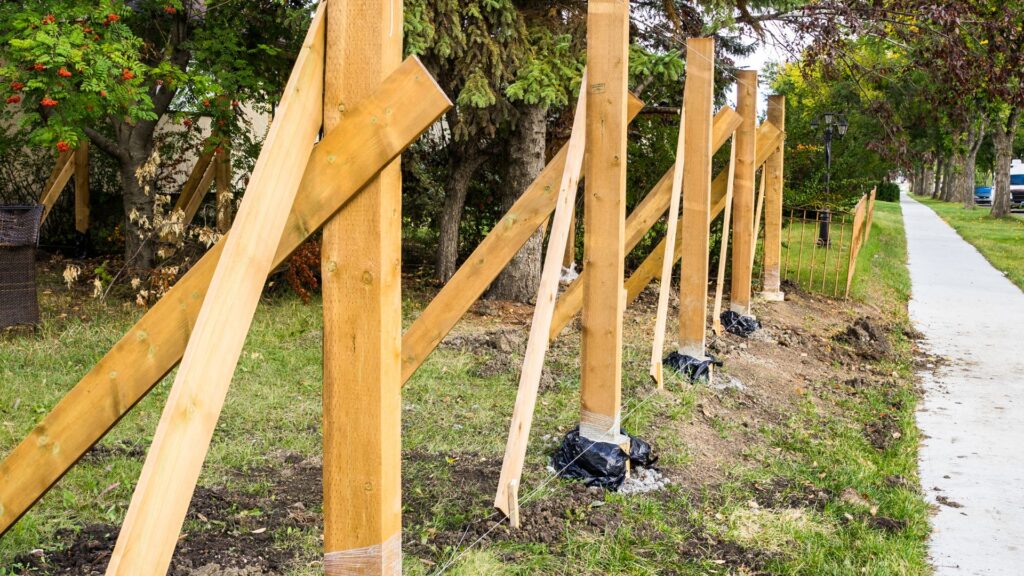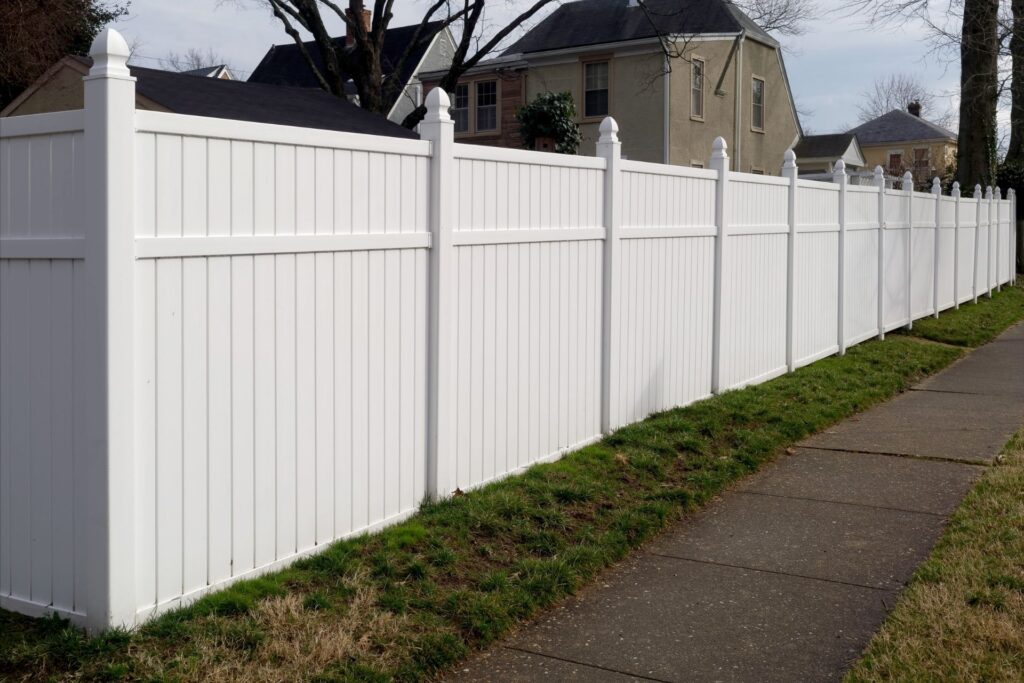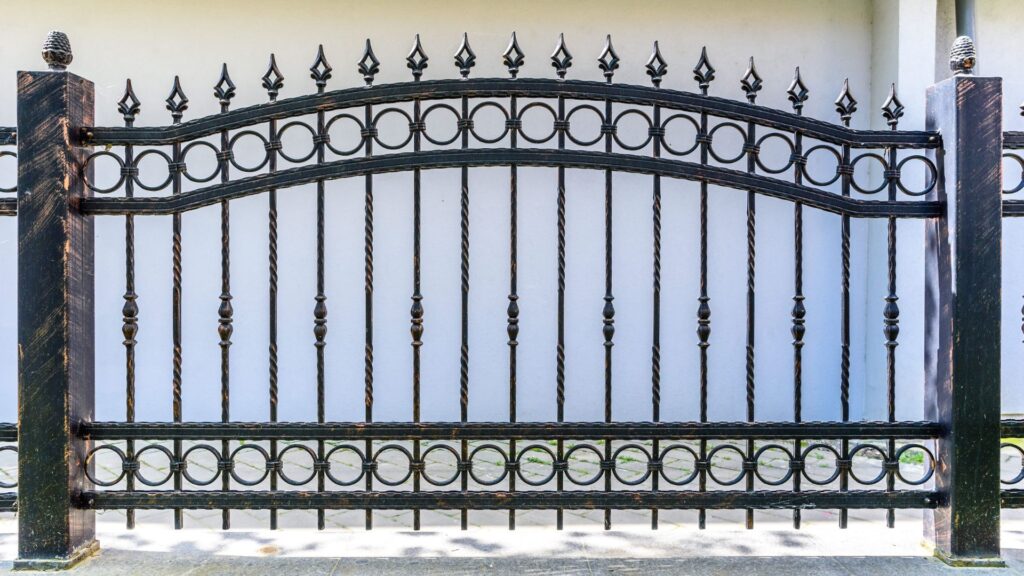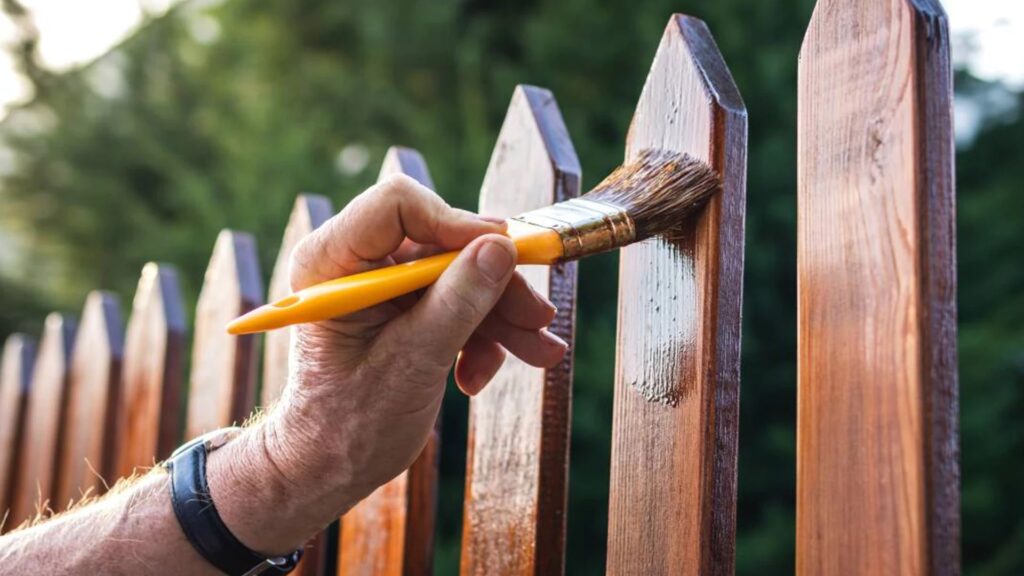Welcome to our comprehensive guide on choosing the perfect gate material for your home. If you’re in the market for a new gate, you’ve probably come across two popular options: aluminium and wood. Each material has its own unique advantages, but which one is truly the better choice for your needs? In this post, we’ll explore the differences between aluminium and wood gates, covering everything from aesthetics and durability to maintenance, cost, and environmental impact. By the end, you’ll have all the information you need to make an informed decision and choose the gate that perfectly suits your home and lifestyle. Let’s dive in!
Aluminium gates are generally considered better than wood for several reasons. They are more durable, require less maintenance, and are resistant to rust, corrosion, and weather-related damage. While wood offers a classic, natural look, it is more prone to warping, rotting, and requires regular upkeep. Aluminium gates also offer a wide range of design options, including wood-like finishes, making them a versatile and long-lasting choice for homeowners.
Table of Contents
Aesthetics And Curb Appeal
Opening Question: “When it comes to first impressions, how do aluminium and wood gates measure up?”
First impressions play a significant role when it comes to your home’s exterior, and the gate is often one of the first elements people notice. Both aluminium and wood gates offer unique aesthetic qualities, and understanding their visual appeal can help you choose the right fit for your property. Let’s break down how each material performs in terms of aesthetics and curb appeal.
Wood Gates
Wood gates have long been admired for their natural, classic beauty. The warmth and authenticity that wood brings to a home’s entrance make it an ideal choice for those looking to enhance a traditional or rustic ambiance. Homeowners often appreciate the organic feel of wood, which adds a sense of timelessness and character to their property.
One of the standout features of wood gates is their versatility in terms of customization. Whether you’re looking for intricately carved designs, decorative accents, or custom paint finishes, wood offers a range of possibilities to suit your personal taste and complement your home’s exterior. You can stain wood gates to bring out their natural grain, or paint them in colors that match your overall exterior theme. The ability to adapt wood to various styles makes it a go-to material for those who appreciate a more personalized, hands-on approach to home design.
Aluminium Gates
In contrast, aluminium gates offer a sleek, modern look that appeals to those who favor contemporary design. Aluminium gates are known for their clean lines and minimalist appeal, making them a popular choice for homes with modern architectural styles. One of the key advantages of aluminium is its ability to mimic a variety of textures, including wood grain finishes, allowing you to enjoy the look of wood without the upkeep that comes with it.
Aluminium gates are available in a wide range of colors and finishes, giving homeowners the flexibility to find the perfect match for their exterior design. Whether you prefer a matte black for a bold, industrial look or a lighter tone for a subtle, modern finish, aluminium gates can fit seamlessly into various design schemes. They provide a versatile option for those who want a contemporary aesthetic while benefiting from the durability and low maintenance that aluminium offers.
When choosing between wood and aluminium gates, both materials bring their own aesthetic appeal to the table. Wood gates exude a timeless charm, perfect for homeowners who love traditional, rustic designs. On the other hand, aluminium gates offer sleek modernity with a vast range of customization options for those with a more contemporary or minimalist style. Ultimately, the right choice depends on the aesthetic you’re aiming for and how you’d like your home to make that all-important first impression.

Durability And Longevity
Introduction
When selecting a gate, durability is a critical factor. A gate isn’t just about aesthetics—it’s an investment meant to last for years. But how well do wood and aluminum gates hold up against the test of time and elements? Let’s dive into how each material fares in terms of longevity and maintenance.
Wood Gates
Wood gates are a timeless choice, offering natural beauty and a classic look that can complement almost any property. However, when it comes to durability, wood has its challenges. One of the main concerns is its vulnerability to weather conditions. Wood, being an organic material, reacts to environmental factors like moisture, heat, and pests. Over time, wood can warp, crack, or even split due to exposure to rain, snow, and extreme heat. Humidity can also lead to rotting, and areas with high moisture levels are particularly tough on wood gates.
Additionally, wood is a target for termites and other pests, which can compromise its structure if left untreated. While some types of wood—like cedar and redwood—are more resistant to these issues, they still require consistent maintenance to maintain their integrity. Regular treatments, such as applying sealants and stains, are essential to protect the wood from water damage, UV rays, and insect infestations. Without these treatments, the lifespan of a wood gate can be significantly shortened. Furthermore, periodic repairs may be needed to address splitting or rotting parts, ensuring the gate continues to function properly.
Aluminum Gates
Aluminum gates, on the other hand, are known for their exceptional durability and resistance to environmental wear and tear. Unlike wood, aluminum is naturally resistant to rust and corrosion, making it an ideal choice for regions with harsh weather conditions, including heavy rainfall or salty coastal air. This resistance to moisture also means that aluminum won’t warp, crack, or rot, even after years of exposure to the elements.
Aluminum’s lightweight structure does not compromise its strength. It remains robust and reliable without the issues commonly associated with wood. This material requires far less upkeep than wood—there’s no need for regular treatments, and repairs are rare. An occasional rinse to remove dirt or debris is often all it takes to keep an aluminum gate looking and functioning at its best. The minimal maintenance requirements of aluminum gates make them a popular choice for homeowners looking for a hassle-free, long-lasting solution.
When it comes to durability and longevity, aluminum gates outperform wood gates with ease. Aluminum offers a low-maintenance, long-lasting option that resists the wear and tear of everyday life, while wood gates, though beautiful, require regular upkeep and treatments to maintain their appearance and structural integrity. For homeowners seeking a gate that stands the test of time with minimal effort, aluminum is the clear winner. However, if you’re willing to invest the time and care, a wood gate can still offer charm and elegance.
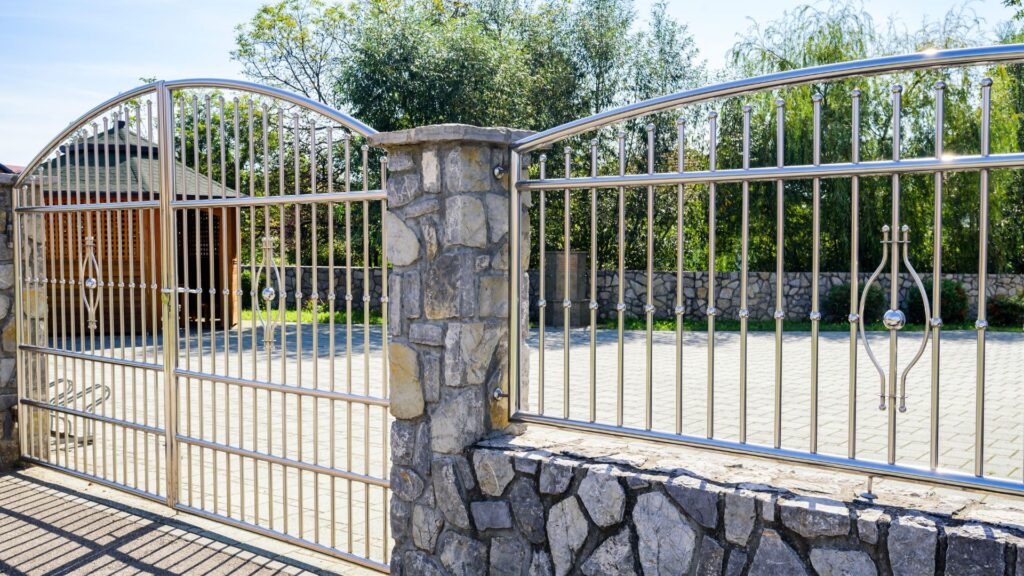
Maintenance
Introduction: The Cost and Time of Maintaining Your Gate
When selecting a gate for your property, one crucial factor often overlooked is maintenance. The amount of time and money you’re willing to invest in upkeep can significantly impact your decision. So, ask yourself, how much time and money are you willing to spend on maintaining your gate? Below, we’ll explore the maintenance requirements of two popular gate materials: wood and aluminum, helping you decide which best suits your lifestyle and long-term goals.
Wood Gates: Traditional Beauty, Hands-On Care
Wood gates provide timeless elegance and natural beauty, but they do require ongoing attention to keep them looking their best. Here’s what you can expect when it comes to maintaining a wood gate:
1. Sanding: Over time, exposure to the elements can cause the wood surface to become rough or uneven. To keep your gate smooth and splinter-free, periodic sanding is necessary, especially if you notice the finish starting to wear.
2. Repainting or Staining: Wood naturally deteriorates without protection. Repainting or staining your gate every couple of years will help to preserve its appearance and protect it from weather damage. This process can be time-consuming but is essential to prolonging the life of the wood.
3. Treating Against Pests: Wood is susceptible to damage from pests like termites or wood-boring insects. Applying a sealant or pesticide treatment can safeguard your gate from these threats, but this adds to your maintenance list.
4. Repair Costs: Wood, as a natural material, is prone to rotting, warping, or splitting over time, especially when exposed to moisture. Replacing damaged sections or repairing structural issues can lead to higher costs over the years, making wood gates a more hands-on investment.
While wood gates can add rustic charm and a touch of nature to your property, the upkeep involved means you’ll need to be prepared for regular maintenance tasks.
Aluminium Gates: Durable and Low-Maintenance
If you prefer a gate that looks great with minimal effort, aluminium might be your perfect choice. Aluminium gates are known for their virtually maintenance-free nature. Here’s why they’re an excellent option for those seeking low upkeep:
1. Minimal Cleaning: Unlike wood, aluminium doesn’t require sanding, painting, or treating. The most you’ll need to do is give your gate an occasional wash to remove dirt, dust, or debris. Simply use a hose or a cloth with mild soap and water to keep it looking pristine.
2. Durable Finish: Most aluminium gates come with a powder-coated finish, which is highly durable and resistant to chipping, fading, and corrosion. This means you won’t need to worry about repainting or refinishing, even after years of exposure to the elements.
3. Weather and Pest Resistant: Aluminium doesn’t rot, warp, or attract pests, making it a longer-lasting choice with fewer repair costs. Its resistance to harsh weather conditions also makes it a great option in areas with extreme climates, where wood might suffer more wear and tear.
Overall, aluminium gates offer a sleek, modern look without the need for constant care, saving you both time and money in the long run.
If you’re looking for a gate that requires little effort to maintain, aluminium gates are the clear winner. Their durability and low-maintenance nature make them ideal for homeowners who prefer convenience and longevity. On the other hand, if you don’t mind investing some time and care into upkeep, wood gates can offer a rewarding charm and natural beauty that’s hard to beat. The choice ultimately depends on your lifestyle and maintenance preferences.

Cost And Affordability
When it comes to selecting a gate for your property, cost is often one of the most critical factors. Homeowners are typically faced with the choice between aluminium and wood gates, each offering its own set of advantages and cost considerations. In this section, we’ll break down the cost differences between these materials to help you make an informed decision.
Wood Gates: Initial Costs and Ongoing Expenses
The price of a wood gate can vary significantly, largely depending on the type of wood used. Softwoods, such as pine or cedar, are typically more affordable, with lower upfront costs. These woods can be a great option for homeowners looking for a budget-friendly solution. However, hardwoods like oak or teak are more expensive due to their durability and aesthetic appeal, making them a popular choice for custom or luxury wood gates.
While wood gates may appear more affordable at first, the long-term costs should be carefully considered. Wood is a natural material, and over time, it can be susceptible to warping, rotting, and insect damage. Regular maintenance, such as staining, painting, and sealing, is essential to prolong the life of a wood gate. Neglecting this upkeep can lead to expensive repairs or even replacement costs down the road. Therefore, although wood gates may save you money initially, ongoing maintenance expenses can add up over time.
For those opting for high-end wood species or custom designs, the price of a wood gate can rise significantly. Custom woodwork offers unique, handcrafted designs, but it can dramatically increase both the initial cost and long-term care requirements.
Aluminium Gates: Higher Upfront Cost, Lower Long-Term Maintenance
Aluminium gates typically come with a higher upfront cost compared to wood gates. The price may vary based on the size and design, but aluminium offers more consistency in pricing. This consistency can be attributed to the uniform manufacturing process of aluminium gates, which ensures fewer fluctuations in cost compared to the wide variety of wood types available.
One of the key benefits of aluminium gates is their low maintenance requirements. Unlike wood, aluminium does not rot, warp, or rust, making it a highly durable material that withstands various weather conditions with minimal upkeep. This lack of regular maintenance translates to long-term cost savings, as you won’t need to spend money on treatments, repairs, or frequent replacements. Although the initial investment for aluminium gates may be higher, these gates offer greater value over time due to the significant reduction in maintenance costs.
When comparing the cost of wood and aluminium gates, it’s important to consider both initial expenses and long-term value. Wood gates may seem more affordable upfront, especially if using softwood or standard designs. However, ongoing maintenance and the potential for repairs can increase the overall cost in the long run. Aluminium gates, while carrying a higher initial price tag, provide long-term savings through their durability and minimal maintenance needs. Ultimately, for homeowners looking to make a long-lasting investment, aluminium gates may offer better value over time.
Choosing between wood and aluminium gates comes down to personal preferences, budget, and how much time you’re willing to dedicate to upkeep.

Environmental Impact
For the eco-conscious homeowner, choosing the right material for a gate goes beyond factors like aesthetics and budget. It’s essential to consider the environmental implications of each material, particularly when comparing aluminium and wood gates. These two popular options differ in how they affect the planet, from sourcing and manufacturing to long-term sustainability. So, how do aluminium and wood gates stack up when it comes to their environmental impact?
Wood Gates
Wood has long been considered a natural and renewable resource, making it an attractive choice for those seeking a traditional, organic look. However, while wood is renewable, it’s important to recognize the environmental costs associated with its use. Deforestation is a significant concern. The over-harvesting of trees for wood products can contribute to habitat destruction, loss of biodiversity, and increased carbon emissions. These issues make it crucial to carefully consider where and how the wood is sourced.
One way to mitigate the environmental impact of wood gates is to choose sustainably sourced wood. Homeowners should look for wood that carries certifications like FSC (Forest Stewardship Council), which ensures the wood is harvested responsibly and with minimal damage to ecosystems. FSC-certified wood supports forests that are managed sustainably, preserving the environmental balance and ensuring the wood supply is replenished.
However, it’s not just the source of the wood that impacts the environment—there’s also the issue of maintenance. Wood gates often require chemical treatments such as sealants, stains, and varnishes to protect against weathering, insects, and rot. These chemicals can leach into the soil and water, contributing to pollution. Additionally, the need for regular maintenance, repairs, and replacements can result in a higher overall environmental cost over the lifespan of a wood gate.
Aluminium Gates
In contrast, aluminium gates present a different set of environmental benefits and challenges. A standout feature of aluminium is its recyclability. Aluminium is one of the most widely recycled materials in the world, and many aluminium gates are made from recycled materials. This reduces the need for new raw material extraction, helping to conserve natural resources and lower energy consumption.
Aluminium’s recyclability also means that once an aluminium gate has reached the end of its useful life, it can be recycled again and again without losing its strength or quality. This closed-loop recycling process significantly reduces waste and minimizes the environmental footprint of aluminium products.
Moreover, aluminium gates require far less maintenance compared to wood. They don’t need chemical treatments to protect them from the elements, as aluminium is naturally resistant to rust and corrosion. This means no environmentally harmful sealants, paints, or preservatives are needed, and the gate will last much longer without the need for frequent repairs or replacements. In fact, the long lifespan of aluminium gates contributes to their overall sustainability, as fewer resources are consumed over time.
Both wood and aluminium gates have their pros and cons when it comes to environmental impact. Wood is a renewable resource and can be sustainably sourced, but concerns over deforestation and the use of harmful chemicals for maintenance are significant drawbacks. On the other hand, aluminium’s recyclability, lower maintenance needs, and long lifespan make it a more environmentally friendly option in the long run. For homeowners seeking a greener choice, aluminium gates often provide a more sustainable solution, offering durability without the environmental trade-offs associated with other materials.

Security And Strength
When choosing a gate for your home, security is often the top priority. The gate serves as the first barrier between your home and the outside world, playing a crucial role in protecting your family and property. But when comparing aluminium and wood gates, how do they stack up in terms of security? Each material brings unique benefits, but also potential downsides when it comes to long-term strength and resilience.
Wood Gates
At first glance, wood gates exude a sense of traditional strength. Their solid, natural appearance often gives homeowners peace of mind, as they look robust and imposing. However, the strength of a wood gate can deteriorate over time. Exposure to weather conditions like rain, extreme heat, and humidity can cause the wood to weaken, warp, or even rot. Additionally, wood is susceptible to pests, such as termites, which can compromise its integrity from the inside out. Without regular maintenance, such as sealing, painting, or pest control treatments, wood gates can lose their sturdiness, leaving your home vulnerable.
Aluminium Gates
In contrast, aluminium gates offer a modern solution to the security concerns of homeowners. While they may not have the heavy, imposing look of wood, aluminium is known for being lightweight yet incredibly strong. This material is resistant to rust, corrosion, and pests, meaning it won’t weaken or warp over time. Aluminium’s natural durability ensures it maintains its structural integrity even when exposed to harsh weather conditions, making it an ideal choice for long-term security.
Additionally, aluminium gates are highly versatile when it comes to integrating advanced security features. Many aluminium gates can be easily fitted with modern security systems, including automated entry, smart locks, and surveillance cameras. This adaptability allows homeowners to enhance their overall security system without compromising the gate’s strength or aesthetics.
Both wood and aluminium gates can provide a degree of security for your home. However, aluminium’s superior durability and resistance to the elements make it a more reliable choice for long-term protection. If you’re looking for a gate that can withstand both physical threats and environmental challenges, aluminium is the clear winner when it comes to maintaining security and strength over time.
Choosing the right gate for your home is a decision that impacts both your security and peace of mind—so, while wood may offer a traditional appeal, aluminium stands out as the more dependable option for homeowners focused on long-term security.
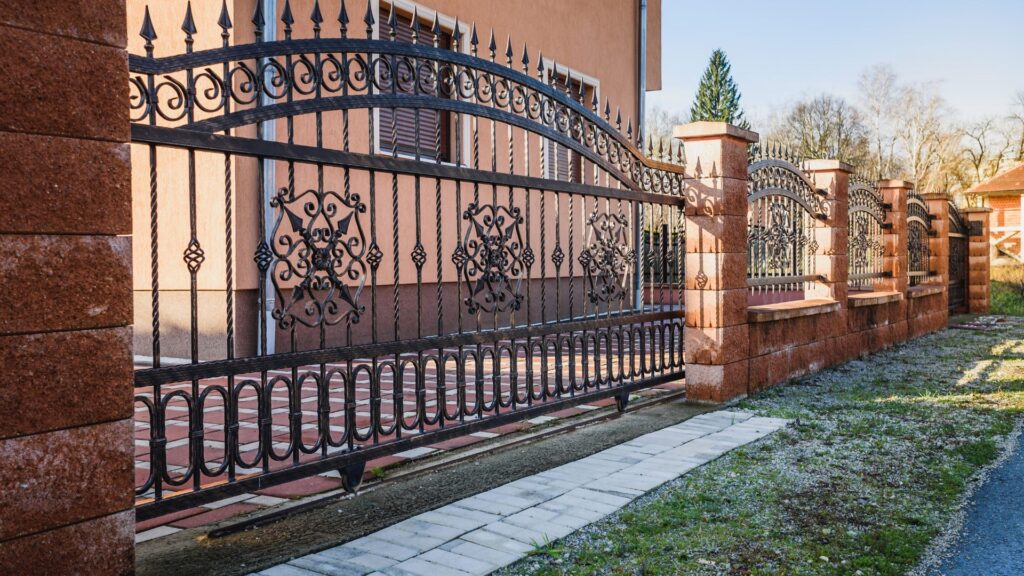
Customization And Design Flexibility
When selecting a gate for your home or property, design and customization are key factors to consider. Whether you’re aiming for a specific aesthetic or need a gate that fits an unusual space, both wood and aluminum gates offer great flexibility in terms of style, shape, and finish. Your choice will depend on your personal preferences and the overall design of your property.
Wood Gates
Wood gates are renowned for their natural beauty and classic appeal. One of the greatest advantages of wood is its flexibility when it comes to custom designs. Skilled artisans can craft wood into a wide range of shapes and styles, from traditional to highly intricate and decorative patterns. Whether you’re envisioning a rustic, old-world charm or something more contemporary, wood offers endless possibilities.
In terms of finishes, wood can be stained or painted in virtually any color, allowing you to match it with your home’s exterior or landscape. The craftsmanship involved in creating wooden gates often allows for unique, one-of-a-kind designs, such as detailed carvings or ornate accents, giving your gate a distinctive look. This level of customization is a significant advantage for homeowners who want their gate to reflect a personalized touch and craftsmanship.
Aluminum Gates
Aluminum, on the other hand, offers a different type of versatility. While it may not carry the same traditional appeal as wood, it excels in modern design flexibility. Aluminum gates can be easily fabricated into a wide range of styles, from sleek, minimalist designs to more elaborate patterns. One of the key advantages of aluminum is its ability to mimic the appearance of other materials, including wood. With advanced finishes, aluminum gates can replicate the grain and texture of wood, offering the warmth and appearance of timber without the maintenance requirements.
For those who prefer a contemporary aesthetic, aluminum gates can be designed with geometric patterns, sleek lines, or modern finishes like matte, glossy, or textured coatings. The lightweight nature of aluminum also makes it easier to shape into custom sizes and designs, which is particularly beneficial for properties with unique layout challenges. The material is ideal for those who want a blend of durability and design versatility.
Both wood and aluminum gates offer substantial customization options, making them suitable for a range of architectural styles. However, while wood is perfect for those who appreciate traditional craftsmanship and detailed designs, aluminum tends to be more appealing to homeowners seeking a contemporary look with modern finishes. Its ability to mimic various textures and easily adapt to sleek, geometric designs gives aluminum an edge for those leaning towards a modern aesthetic. Ultimately, your choice will depend on your desired balance between timeless craftsmanship and cutting-edge design flexibility.

FAQs: About Are Aluminium Gates Better Than Wood
Are aluminium gates more durable than wood gates?
Yes, aluminium gates are generally more durable than wood gates. Aluminium is resistant to rust, corrosion, and weather-related damage, making it ideal for long-term use. Wood, while strong, can warp, crack, or rot over time, especially without regular maintenance.
Which material is more cost-effective: aluminium or wood?
Aluminium gates tend to have a higher upfront cost, but they require less maintenance over time, which can save money in the long run. Wood gates may have a lower initial cost, but the expenses for regular treatments, repairs, and potential replacements make them more costly over time.
Do aluminium gates require maintenance?
Aluminium gates require very little maintenance compared to wood. Occasional cleaning to remove dirt or debris is usually sufficient. Unlike wood, aluminium doesn’t need regular painting, staining, or sealing to maintain its appearance and durability.
Can aluminium gates be designed to look like wood?
Yes, aluminium gates can be designed with finishes that mimic the look of wood, providing the aesthetic appeal of wood without the associated maintenance. These wood-like finishes offer a realistic appearance while retaining aluminium’s durability.
Which material offers better security: aluminium or wood?
Aluminium gates provide better long-term security due to their strength and resistance to wear and tear. While wood gates can be sturdy initially, they may weaken over time due to environmental factors, whereas aluminium remains strong and durable.
Which is more eco-friendly: aluminium or wood gates?
Both materials have eco-friendly options. Aluminium is highly recyclable and often made from recycled materials, making it an environmentally friendly choice. Wood is a renewable resource, but it depends on sustainable sourcing and requires treatments that may involve chemicals.
How do aluminium and wood gates compare in terms of aesthetics?
Wood gates offer a classic, natural appearance that appeals to homeowners seeking a traditional look. Aluminium gates, on the other hand, provide a sleek, modern design but can also be customized to mimic wood or other materials, offering more versatility in design options.
Are wood gates more customizable than aluminium gates?
Wood gates are highly customizable due to their ability to be carved, stained, or painted in various ways. However, aluminium gates are also versatile and can be fabricated in a wide range of designs, including modern geometric patterns or wood-like finishes, making both materials flexible in design.
How long do wood gates last compared to aluminium gates?
Aluminium gates typically last longer than wood gates because they are resistant to rust, corrosion, and weather damage. With minimal maintenance, an aluminium gate can last several decades, whereas wood gates may need repairs or replacement after 10-20 years, depending on maintenance and environmental factors.
Which material is better for harsh weather conditions: aluminium or wood?
Aluminium is better suited for harsh weather conditions as it resists rust, corrosion, and does not warp or crack due to temperature changes. Wood is more vulnerable to damage from rain, snow, and extreme heat, which can cause it to rot, swell, or warp without proper care.
Conclusion
In conclusion, when deciding between aluminum and wood, it’s essential to consider various factors such as aesthetics, durability, maintenance, cost, environmental impact, security, and customization. Aluminum offers a sleek, modern appearance, exceptional durability, low maintenance, and a longer lifespan, making it a cost-effective choice for those prioritizing ease and longevity. On the other hand, wood brings a timeless, classic charm that enhances warmth and natural beauty but requires more upkeep and can be more costly in the long run. Ultimately, the decision comes down to personal preference and priorities. If you prefer a hassle-free, contemporary solution, aluminum is your best bet, but if you appreciate the rustic elegance and are willing to invest time in maintenance, wood remains an enduring and stylish option.
About the Author:
Mike Veail is a recognized digital marketing expert with over 6 years of experience in helping tradespeople and small businesses thrive online. A former quantity surveyor, Mike combines deep industry knowledge with hands-on expertise in SEO and Google Ads. His marketing strategies are tailored to the specific needs of the trades sector, helping businesses increase visibility and generate more leads through proven, ethical methods.
Mike has successfully partnered with numerous companies, establishing a track record of delivering measurable results. His work has been featured across various platforms that showcase his expertise in lead generation and online marketing for the trades sector.
Learn more about Mike's experience and services at https://theleadguy.online or follow him on social media:


